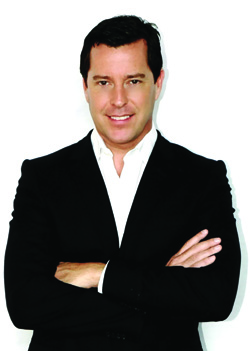BY AUSTIN VICKERS
One of the most common questions I get when speaking is: How can I feel passionate about life, when I don’t even know what my passions are?
Many people experience these feelings and feel lost in life as a result. I know I once felt that way and this is how I made my way out of that mindset and discovered my purpose and my passion in life. It starts with a great question and an exercise. The question is this: if you could do or be anything, and you had the means to accomplish it, and there was no possibility of failure, would you do or be anything different than what you are doing or being today? If you answered no to this question, then there is a pretty good chance that your life is extremely passionate and meaningful and you are living out your dreams.
 But if you answered yes, then perhaps it is time to consider that perhaps you are compromising your dreams. A great coach of mine many years ago asked me this powerful question, and my internal response was sobering.
But if you answered yes, then perhaps it is time to consider that perhaps you are compromising your dreams. A great coach of mine many years ago asked me this powerful question, and my internal response was sobering.
I knew the minute he asked the question what my response was, and it made me sad, because I knew that I was compromising myself. Like many people do, I immediately came up with all kinds of reasons and justifications for my compromise. He then led me into an exercise that changed my life. And it has the potential to change yours as well, if indeed it needs changing and you open your mind to it.
He asked me to get out a piece of paper and write down the top five values about life that were most important to me, and that would best describe the ideal life as I would define it.
At the time I was practicing as a corporate attorney, and although I was making a lot of money, I was not very happy and I was having difficulty fully understanding why. So in response to the question, I got out a piece of paper and I wrote down 5 things that would describe my ideal life. This is what my list looked like. Not necessarily in order of priority, I wanted:
1) a life that was altruistic and one that helped people;
2) I wanted freedom of schedule;
3) I wanted to work with people;
4) I wanted good financial reward; and
5) I wanted what I would consider to be an extraordinary life. Then my coach asked me to compare that list against my life and see how I was showing up.
Although depressing, the comparison enlightened me. First of all, helping Fortune 500 companies make millions of dollars a year in profit did not feel altruistic to me, so I was 0 for 1 at that point. Second, I had no freedom of schedule. I went to work at 8:00 am in the morning and most days worked until 7:00 at night, and I worked most weekends. Hardly the freedom of schedule that I desired. 0 for 2. As far as working with people, one of my principle duties as a corporate lawyer was investigating misconduct charges with employees and getting involved with the process of informing high-level employees of their rights when they were being fired. As you might expect, this task did not endear me to my peers and other employees in the company. Walking into someone’s office often felt like what the devil might feel like walking into a convention of Catholic cardinals. Not exactly a warm and embracing audience. 0 for 3.
An ideal life for me also included having a good financial reward for my efforts, and working as an international corporate lawyer for one of the biggest and most successful companies in the world certainly provided that . . . they paid me a huge salary, gave me lots of options, bonuses and monetary incentives, paid for my house in one of the most exclusive areas of England, paid for my very nice car and the gas I put in it, put my kids in the best private schools, and even paid for my vacations back to the United States. So this was one aspect of the ideal life that I was living. So 1 for 4. Finally, I wanted to live an extraordinary life. There were many people at the time who thought, and still think, that my life was extraordinary. I was young, and one of a handful of American lawyers living and working in Europe, in the developing legal system of the European Union.
Intellectually it was very challenging, and the travel and experience I was receiving was extensive. I was responsible for a legal and regulatory area that included 27 countries in Western and Eastern Europe, and a few parts of the Middle East. We had offices, in London, Nice, Rome, Madrid, Copenhagen, Hamburg, and Switzerland that fell under my domain, and I spent a lot of time traveling to all of these countries and many more, involved in pretty high level negotiations for a myriad of different contracts and business issues.
It’s hard to convince a lot of people that your life is not that extraordinary, when you are calling them from Madrid one day, Rome the next, and Finland a day later. But the reality was that although my life was extraordinary as many other people would define it, it was not so by my own definition. And in the world of passion and authentic power, our own definition is the only one that counts.
I have many vivid memories of sitting in business meetings with people who were not healthy, who were certainly not that happy, and who were not that interesting, choosing to compromise their own dreams in order to receive their big pay checks every week. These were not people who I respected. I was always more impressed with individuals who were entrepreneurs, or artists, or writers, or explorers, or anyone who would enthusiastically describe some unique aspect of life they were struggling to create. These were the people I wanted to associate with, and I wanted to be inspired by. These were the people that I believed were living an extraordinary life, and I was not one of them. So, that made my values analysis a whopping 1 out of 5, and I wondered why I was so unhappy and depressed. The only value I was living was my desire for good financial reward, and that was hardly enough to make me happy.
Going through this exercise significantly opened my eyes. I now knew, not only why I was so unhappy and feeling so dispassionate about life, but also the characteristics and values I would need to have as a part of any career or life choice if I truly wanted to be happy. I instantly recognized this as powerful information that could help guide my life.
In the pursuit of a life of passion, I encourage each of you to go through the same kind of self-analysis. Sit down with a piece of paper and a pen and write down a list with the top five values or characteristics that would create the most ideal life that you can imagine. Then evaluate your life honestly and realistically against this list, and see how you measure up.
If you are like me, and after doing this exercise, you realize that you are not living your values or your passions, do not despair.
You now have a roadmap with which to evaluate every career and life decision you will ever make again in your life, and slowly but surely you can begin to take actions that move your life from one of obligation and compromise, to a life of vision, passion, and authentic power.
You can begin to make choices that are in alignment with your values, and steer away from those that are not. Doing so will significantly enhance and develop your passion in life. Compromise is perhaps the biggest hurdle we will face in the development of our passion. So many people fail to live extraordinary lives, because they live comfortable lives, and they are unwilling to risk that comfort to follow their passions. I encourage you to risk that comfort to follow your dreams.

 Whoever thought a man’s skin would be more sensitive than a woman’s? Well when it comes to skincare apparently it is. Although men’s skin is twice as oily as a woman’s and up to 20% thicker it is still sensitive and needs protection.
Whoever thought a man’s skin would be more sensitive than a woman’s? Well when it comes to skincare apparently it is. Although men’s skin is twice as oily as a woman’s and up to 20% thicker it is still sensitive and needs protection.


 the skin. Paprika is made from the grinding of dried bell peppers or chili peppers and is high in antioxidants and vitamin C.
the skin. Paprika is made from the grinding of dried bell peppers or chili peppers and is high in antioxidants and vitamin C. Eugenia caryophyllus primarily used as a natural anesthetic and antiseptic stimulant, clove has been cultivated the world over for more than 2,000 years. The oil has long been used in Chinese medicine for detoxification and to stimulate the circulatory system. Its aroma also helps to stimulate the mind.
Eugenia caryophyllus primarily used as a natural anesthetic and antiseptic stimulant, clove has been cultivated the world over for more than 2,000 years. The oil has long been used in Chinese medicine for detoxification and to stimulate the circulatory system. Its aroma also helps to stimulate the mind. Tetrahydrodiferuloy-methane, or Tumeric, is a relative of the ginger root. It is a potent golden spice that provides shielding and healing properties. It protects against damaging environmental elements (UV rays, chemicals, microbes, and other free radicals), and aids in the treatment of acne, hyperpigmentation and eczema, as well as slowing the aging process.
Tetrahydrodiferuloy-methane, or Tumeric, is a relative of the ginger root. It is a potent golden spice that provides shielding and healing properties. It protects against damaging environmental elements (UV rays, chemicals, microbes, and other free radicals), and aids in the treatment of acne, hyperpigmentation and eczema, as well as slowing the aging process. Cinnamomum cassia, with its spicy, awakening fragrance, cinnamon oil is primarily used in skin care preparations for its potent antibacterial and antifungal properties, as well as its stimulating effects. It is the terpenoids found in the oil believed to promote a glowing, healthy complexion. It also contains phenolic compounds, flavonoid derivatives, and its antimicrobial and antioxidant properties work to tighten and lift the skin.
Cinnamomum cassia, with its spicy, awakening fragrance, cinnamon oil is primarily used in skin care preparations for its potent antibacterial and antifungal properties, as well as its stimulating effects. It is the terpenoids found in the oil believed to promote a glowing, healthy complexion. It also contains phenolic compounds, flavonoid derivatives, and its antimicrobial and antioxidant properties work to tighten and lift the skin.









